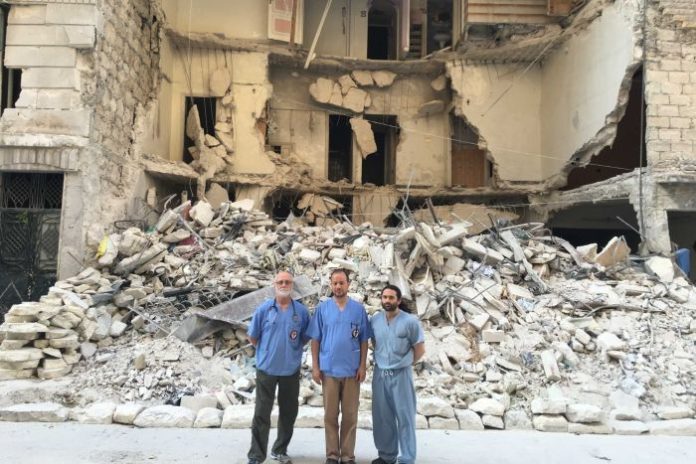
American doctors are risking their lives to help victims of airstrikes in one of the world’s most dangerous cities, Aleppo in Syria.
Orthopaedic surgeon Sam Attar, critical care specialist Zaher Sahloul and paediatrician John Kahler are all doctors from Chicago.
They went to Syria to volunteer and were some of the last people to get out of Aleppo before it was cut off from the world this week, after regime forces took control of the last road leading into the city on Sunday.
“These are innocent civilians and if the world doesn’t act they will just be left to starve and be bombed to death,” Dr Attar told 7.30 after returning from his most recent trip.
The road into Aleppo is one of the most dangerous journeys in the world.
“We’ve seen the car wrecks that are completely burnt, we’ve seen trucks that are turned upside down on the other side, we smelled dead bodies, looks like there’s disintegrating dead bodies that are still trapped in the cars and people are not able or not daring to pull them out,” Dr Sahloul, who is also the chair of the Syrian American Medical Society, told 7.30.
“It was really terrible trip and every second we were at the risk of shelling.”

Dr Kahler, 70, said he felt obliged to risk his life to take the trip after hearing the last paediatrician in Aleppo had been killed in a regime airstrike on a hospital in April.
“I felt it was very important to go and stand side to side in solidarity with the healthcare workers in Aleppo,” he said. “To directly see and to bear witness to the destruction that’s happening there.”
According to Physicians for Human Rights, the Syrian Government has assassinated, bombed and tortured to death almost 700 medical personnel in the past five years.
A UN investigation also found that Syrian Government forces have been systematically attacking hospitals in opposition controlled areas.
“We visited seven hospitals in the city of Aleppo,” Dr Sahloul said.
“Every one of them have been targeted and bombed several times, so it’s not incidental.”
One hospital had been hit so many times by airstrikes that it has, literally, been driven underground and is now operating in the basement with sandbags on the windows.
“In spite of that you have all these people who continue to work in this environment risking their live, knowing that at any moment they might be killed,” Dr Attar said.
The majority of patients the two doctors treated were civilians hit by Syrian Government and Russian airstrikes.

“[One] lady was three months pregnant and she lost her unborn child in addition to two other children,” Dr Attar said.
“She had one son remaining who is uninjured and alive, and was wondering what was going on with his mum.”
“He was trying to act like he is older and trying to — not to cry,” Dr Sahloul said.
“This is a child that had witnessed the death of both of his brother and sister, and most likely, he’ll witness the death of his mum.”
‘Unfortunately you can’t save everyone’
One day while they were working a missile hit a market near the hospital.
“We all heard the missile land. We felt the vibrations. We heard the sirens. We heard the screams,” Dr Attar said.
“And then it was just patient after patient after patient.
“There was [a] child who was very severely injured who wasn’t breathing and we were doing CPR on him. And we had to stop because there was another person next to him who was bleeding to death who had a better chance of making it.
“Those are just decisions that you make and they haunt you forever but in that environment you just do the best you can. You just have to save as many people as you can.
“And unfortunately you can’t save everyone, some people will just get left behind because you don’t have enough people.
“You don’t have enough resources. You don’t have enough blood to transfuse.
“There are people we literally saw bleed to death.”
Bashar al-Assad’s journey from medical student to ‘war criminal’

In a macabre twist for Dr Sahloul, the President of Syria — a man now accused of war crimes — was once his fellow medical student in Damascus.
“Bashar al-Assad, we were classmates in medical school, we graduated in the same year. We were classmate for six years,” he said.
“He was an average student, he wasn’t that arrogant, nothing special about him.”
It is a far cry from Dr Sahloul’s impression of Bashar al-Assad now.
“In these meetings that we had with him he was detail-oriented,” he said.
“It looks like he knew what’s happening in every city in the street, it looks like he was able to make decisions.
“So for people who think that he’s out of reality or disconnected from what’s happening in the street or that he’s not the one who’s making decisions, I would disagree.”
Dr Sahloul said he thinks al-Assad is the one making decisions and was aware of what was happening in Syria.
“But no-one of us, of his colleagues, expected him to be that ruthless or that brutal or to destroy, oversee the destruction of his country, to oversee the killing of more than 450,000 people and the more than 5 million becoming refugees, displacement of half of the population of Syria.
“No-one can understand how he had this shift in his thinking and his personality from being a medical student and a physician to being a war criminal.
“Many of us believe that he’s a war criminal at this point.”
